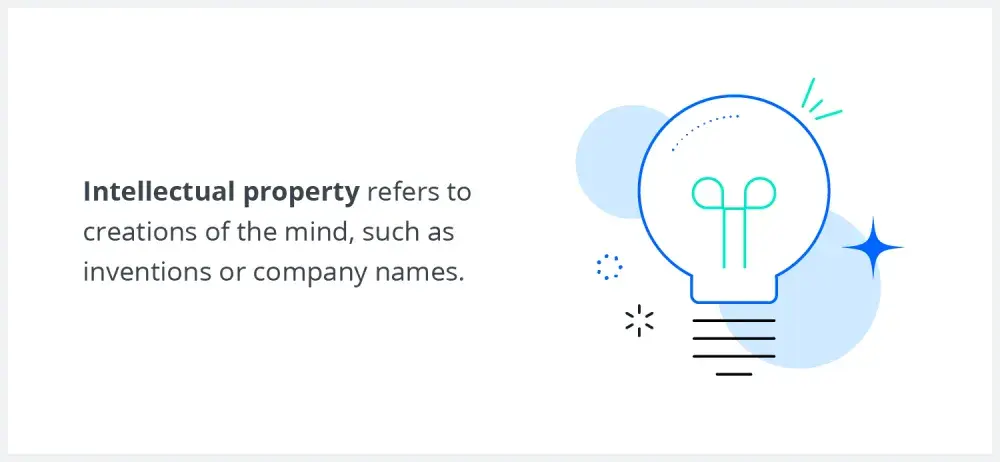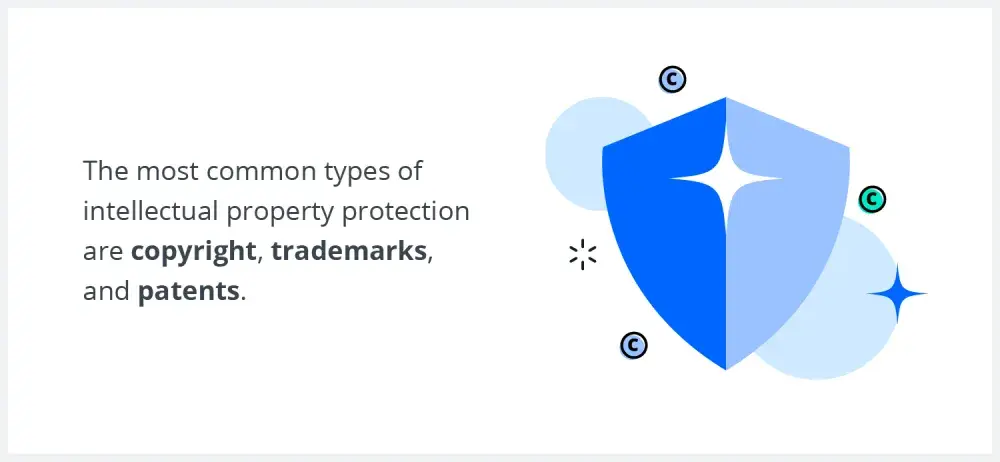
Trademarks, copyrights, and patents can be powerful tools to protect your business and creative works, learn how in our complete guide.
Find out more about intellectual property basics


Jenn is a writer who specializes in real estate, finance, health care, and education. Her words may be found in The N.

Legally reviewed by Allison DeSantis, J.D.
Allison is the Director of Product Counsel at LegalZoom, advising and providing leadership to internal teams on the d.
Updated on: September 3, 2024 · 9 min read
Intellectual property has never been more important. It's often seen as the backbone of a business, protecting the ideas, innovations, and creativity that go into many of the world's top products and services.
This guide to intellectual property will help you understand what intellectual property is, what kind you might have, and what you need to do to protect it.

Intellectual property (IP) refers to creations of the mind that have value. Although it doesn't exist in a physical sense, you still claim what you create as your property, just as you would a house, car, or boat. Along with that claim can come similar IP rights and IP legal protection as one would have with physical property ownership. Trademarks and trade secrets fall under this category.

Soft intellectual property (IP) is a broad term sometimes used to refer to copyrights, trademarks, and trade secrets.
A trade secret refers to commercially valuable confidential information. This trade secret must be something that you take reasonable steps to keep secret and so valuable to businesses that it's worth protecting.
Some common properties that fall under the IP banner are designs, artistic works, business names, and brands. Once created, these unregistered original designs/works/brands become the creator's property, and the creator (now owner) has IP rights over their property.
Intellectual property rights prevent others from using your business property or brand identity without your permission. This is also known as exclusive rights.
Different types of intellectual property fall into different categories, but all IP laws function by preventing others from using your property without your permission. To effectively cover your intellectual property, you'll need to determine what type of IP you have.
It's hard to keep great ideas to yourself, but there is good reason to be careful who you tell, even in the early stages, in order to protect your brand.
If your idea is for an invention, for example, and you don't have the resources or time to file for a formal patent of your IP, filing a provisional patent application for your invention might be a good option for you. A provisional patent application is also a good idea for the protection of industrial design rights.
If you need to share your idea with someone to take it to the next level, you might consider having them sign a non-disclosure agreement (NDA), especially if your ideas are included in your marketing plans or industrial designs for your business.
What can you do if you learn someone is stealing or using your intellectual property without permission? One available option is to write a cease-and-desist letter. You might not need an attorney to do it. The letter notifies the person of what they're doing with your property and what the consequences are.
Most intellectual property can be protected under one of these three categories: patent, trademark, or copyright.
Generally speaking, copyright applies to an original creative work you've created. A patent can apply to an invention, as well as a technical effect of that invention, and a trademark applies to a word, phrase, or design that distinguishes a brand.

According to the U.S. Copyright Office, copyright protects original works of authorship. For example, copyright generally applies to artistic works, from novels to sculptures to symphonies, and even includes architecture and computer software in certain cases.
Words, phrases, designs, or graphics can all be trademarks. They're also what distinguishes your brand, goods, or services from the crowd. You can gain federal trademark rights by registering your trademark for your brand with the U.S. Patent and Trademark Office (USPTO).
This infographic explains the basics of trademarks and why they're important.

Trademarks apply to distinguishing logos, brand names, phrases, and the like. Copyrights apply to original creative works. Patents generally cover new, useful, and non-obvious inventions before you market them and do not apply to certain phrases or works that fall under the public domain.
Getting certain intellectual property protections can sometimes be simple. Some protections actually exist upon creation and before you register your work. However, registration can greatly enhance the protections you have over your property or brand before you market them.
In some cases, you'll want to engage an attorney to ensure that your IP is properly protected.
You can register your trademark online with the U.S. Patent and Trademark Office (USPTO). You can also search their site for any potential conflicts with existing registered trademarks for your services.
Remember that if your trademark conflicts with an existing trademark, it could be rejected by the USPTO.
An attorney can advise you on how to navigate any potential conflicts during the trademark process. And, you may want a lawyer to deal with any infringement issues, whether you are dealing with a case filed against you or enforcing your own trademark rights.
If you're just starting the trademark process for your services and wondering if your circumstances warrant hiring an attorney, read Do you need a lawyer to file a trademark?
While it's possible to write and file a patent yourself, it's often useful to have a lawyer involved. There could be elements of your invention—especially covering future modifications or expansions—that might be hard for you to see on your own before you begin to sell your product.
Patent attorneys are of great value and can save you a lot of headaches down the road. Some people like to file a provisional patent application themselves before seeking investors and interest in their idea. Then, they hire an attorney to help with the formal patent application once they are ready.
A copyright isn't difficult to file on your own, but there are some situations in which it makes sense to consult an attorney. Read more about them in Do you need an attorney to file a copyright?
The fees for IP protection vary based on the type of legal protection you need and the nature of your filing.
The costs of securing IP protection might involve attorney fees as well. People most often engage attorneys for assistance with patents and trademarks. This will make your initial costs higher but can ultimately save you money in the long term. You should also factor in the fees associated with renewing trademark and patent protections over time.
Sometimes applying intellectual property protections to your specific situation can be confusing. There can be some overlap between trademark and copyright. And some unusual works, at first glance, seem to defy categorization.
Below you'll find tips for obtaining protection and how to protect some specific works and categories:
Understanding the difference between influence and outright copying (or plagiarism). Intellectual property protections exist to help define these lines and to allow creators to protect their works and inventions.
If you receive a notice that you are infringing on someone else's intellectual property rights, it is wise not to ignore it, even if you believe the IP rights to fall under the public domain. Investigate the validity of the claim and respond. There can be steep financial consequences for these infringements.
Intellectual property rights can be transferred, just like other types of property. It's common for employers to include agreements in employment contracts explicitly outlining that any inventions created in the employee's course of work are the employer's property.
If you're an employer or employee of a company and wonder how the assignment of IP is commonly handled in this relationship, read Intellectual property assignment: What it is and how to make one.
Intellectual property should also be part of your estate plan. With the potential for generating decades of ongoing revenue and value, protecting the IP of your own creation can be a valuable part of your estate. Learn more in Estate plans and intellectual property: What to consider.
Intellectual property designations and protections exist to protect and help creators and their companies reap the fruits of their labor.
Whether you've invented something amazing, written the next big literary sensation, or created your dream company's logo, protecting your creative work before you market it is the first step to ensuring you reap the benefits of your hard work using this ultimate guide to intellectual property.
Though getting the proper legal protection for your company's intellectual property can take some legwork, it's worth it in the long run.

This article is for informational purposes. This content is not legal advice, it is the expression of the author and has not been evaluated by LegalZoom for accuracy or changes in the law.
You may also like
The death of a loved one can leave questions surrounding the estate plan of the deceased. Is it necessary to go through probate proceedings if there is a will? Each county and state handles probate differently, but this is an overview of the process.
July 29, 2024 · 11min read
Writing a will is one of the most important things you can do for yourself and for your loved ones, and it can be done in just minutes. Are you ready to get started?
July 21, 2024 · 11min read
2024 is one of the best years ever to start an LLC, and you can create yours in only a few steps.
July 29, 2024 · 22min read